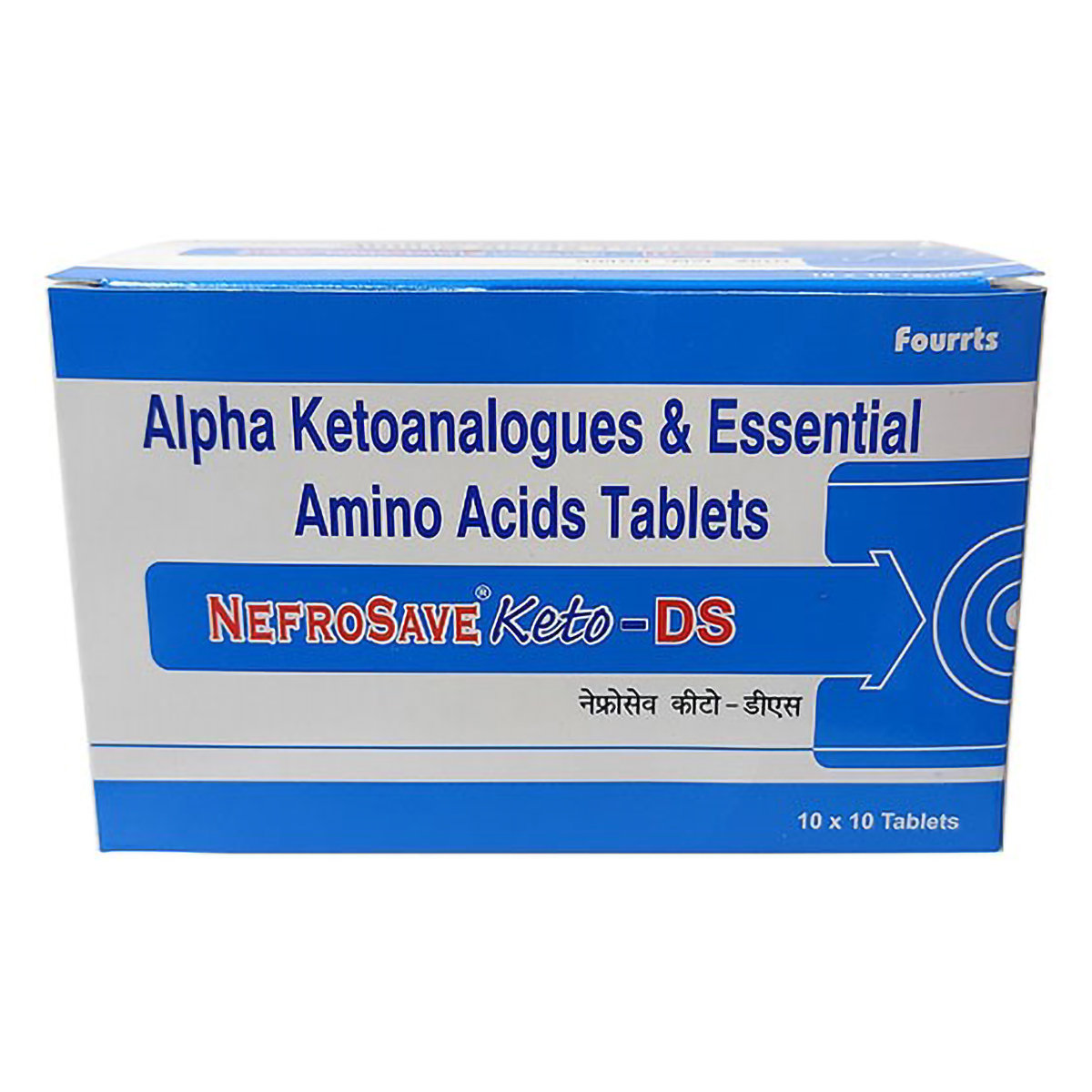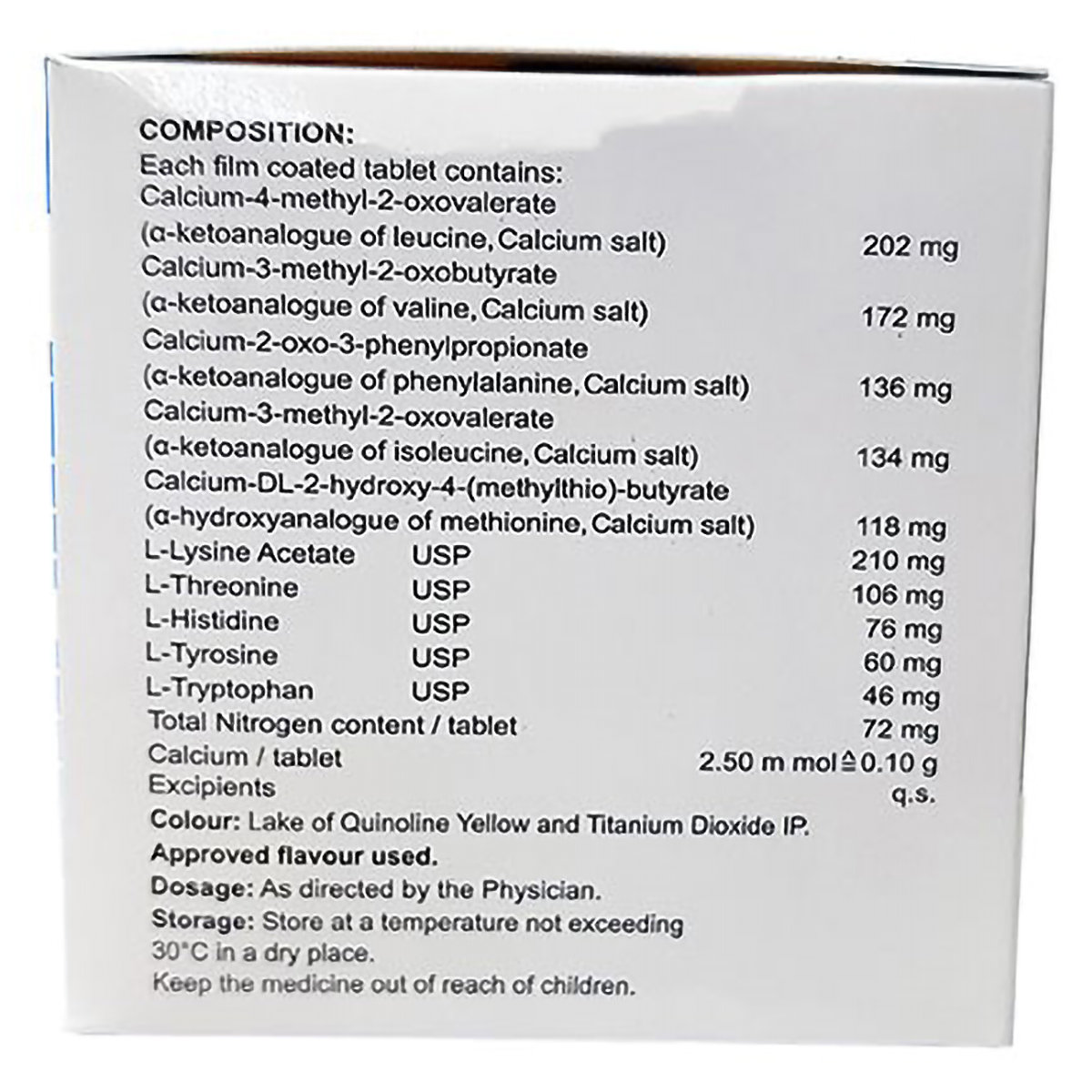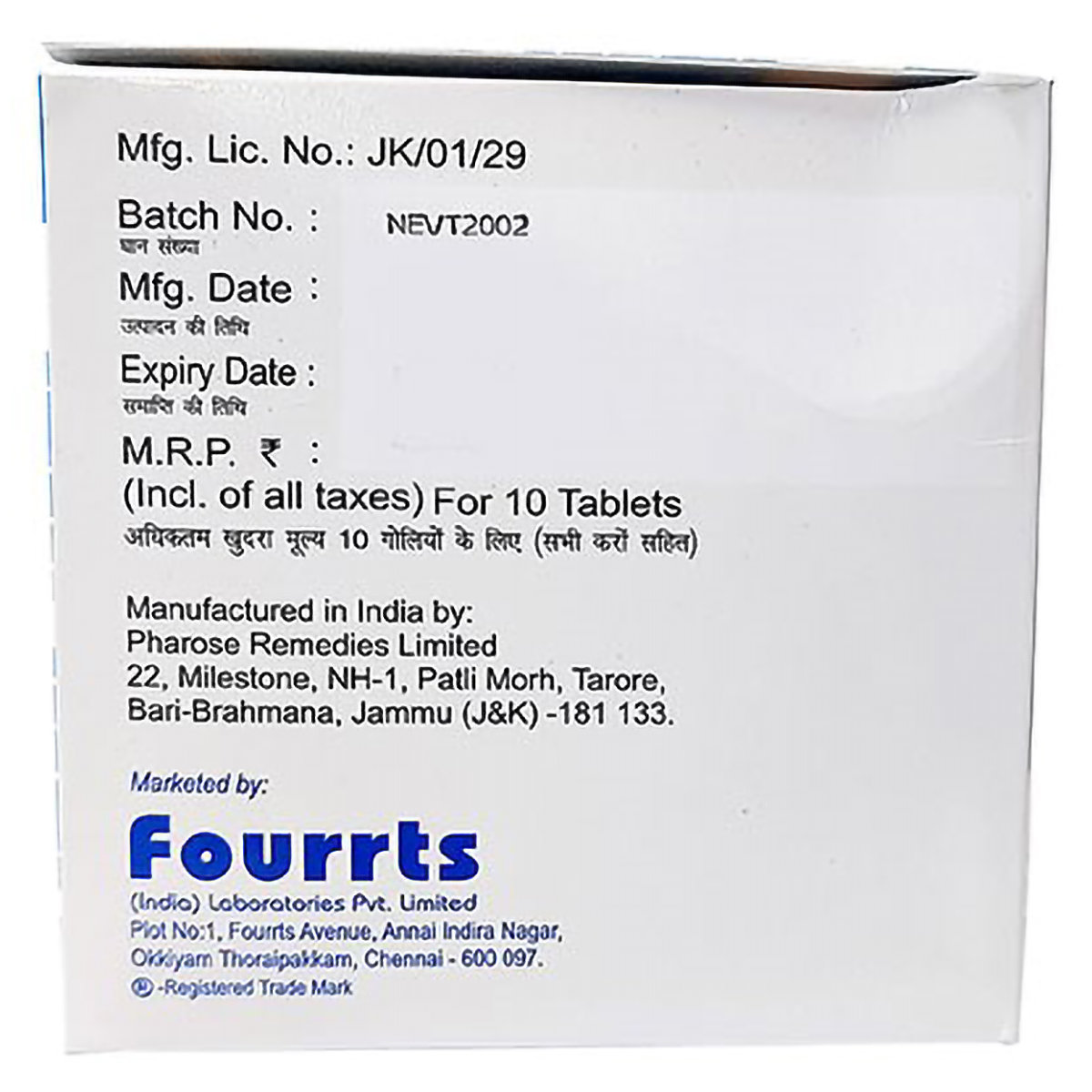Nefrosave Keto-DS Tablet 10's
MRP ₹450
(Inclusive of all Taxes)
₹67.5 Cashback (15%)
Know Your Delivery Time
Provide Delivery Location

Secure Payment

India's Most Trusted Pharmacy

Genuine Products
Manufacturer/Marketer :
Consume Type :
Return Policy :
Expires on or after :
About Nefrosave Keto-DS Tablet
Nefrosave Keto-DS Tablet is used as a balanced calcium-phosphorus supplement for growing children. Calcium and phosphorus deficiency during the critical growth years leads to poor skeletal formation. Phosphorus deficiency may lead to rickets, muscle weakness, Gum disorders, dental caries, etc.
Nefrosave Keto-DS Tablet contains Calcium, phosphorus, magnesium, zinc, and vitamin D3. It provides calcium and phosphorus in the correct ratio. Vitamin D3, Magnesium, and zinc enhance the absorption and utilisation of calcium.
Sometimes, your child may experience certain common side effects, such as bloating, heartburn, dizziness, diarrhoea and constipation. Most of these side effects resolve on their own. If these side effects persist, consult your doctor.
Before using Nefrosave Keto-DS Tablet , please inform the doctor of your children's medical conditions, sensitivities, and all drugs they are taking. Continue using Nefrosave Keto-DS Tablet for as long as the doctor has suggested to treat your child's illness effectively.
Description
Nefrosave Keto-DS Tablet is a nutraceutical supplement used to manage or control chronic kidney disease (CKD). Combined with a very low-protein or low-protein diet, it aids in delaying the progression of kidney disease during the pre-dialysis period. Alpha-ketoanalogues, L-lysine acetate, L-threonine, L-histidine, L-tyrosine, and L-tryptophan are present in Nefrosave Keto-DS Tablet.
Uses of Nefrosave Keto-DS Tablet
Nefrosave Keto-DS Tablet is used in the treatment of nutritional deficiencies. The detailed uses of Nefrosave Keto-DS Tablet are as follows:
- Treatment of Vitamin D Insufficiency: Nefrosave Keto-DS Tablet is frequently used to treat vitamin D insufficiency in people whose vitamin D levels are affected by dietary limitations or inadequate sun exposure.
- Support for Bone Health: Calcium absorption, which is necessary to keep bones strong, is greatly aided by vitamin D. Nefrosave Keto-DS Tablet may lessen the chance of fractures by strengthening bones.
- Immune System Support: Having enough vitamin D may improve the immune system's reaction. The immune system can be strengthened by Nefrosave Keto-DS Tablet , particularly during flu season or when there is heightened vulnerability to infections.
- Nutritional Supplement: Nefrosave Keto-DS Tablet can be used as a nutritional supplement.
- Vitamin C and Phosphorus deficiency: Nefrosave Keto-DS Tablet is frequently used to avoid vitamin C and phosphorus insufficiency in people whose vitamin C levels are affected by dietary limitations.

Have a query?
Directions for Use
- Nefrosave Keto-DS Tablet can be given to your child with meals to help reduce stomach upset.
- Follow your doctor's instructions on the dosage and timing of this medication, or use it as per the labelled instructions.
- Shake the bottle well before each use.
- Give the recommended dose to your child by mouth using the measuring cup provided with the pack.
- Avoid using regular household spoons, as they may not measure the dose correctly.
Medicinal Benefits
- Nefrosave Keto-DS Tablet is a balanced calcium-phosphorus supplement specially formulated for growing children to support healthy bone and teeth development.
- It contains Calcium, Phosphorus, Magnesium, Zinc, and Vitamin D3, which work together to promote optimal growth and mineral balance in the body.
- It provides essential Calcium and Phosphorus in the ideal 2:1 ratio, which is crucial for strong bone and teeth formation.
- Vitamin D3 improves calcium absorption from the intestine and supports proper bone mineralisation.
- It supplies key minerals needed during childhood for healthy muscle, bone, and nerve function.
- It ensures maximum calcium utilisation and prevents imbalance-related issues.
- Zinc and Magnesium contribute to immune function, energy metabolism, and overall growth.
- It helps prevent or treat calcium and phosphorus deficiency conditions such as rickets and osteomalacia.
How Nefrosave Keto-DS Tablet Works
Storage
What if I have taken an overdose of Nefrosave Keto-DS Tablet
Drug Warnings
- Avoid using Nefrosave Keto-DS Tablet if your child is allergic to any of the components in Nefrosave Keto-DS Tablet .
- Inform your doctor if your child has kidney or liver problems.
- Let the doctor know about your child's medical conditions, sensitivities, and all medications.
Drug-Drug Interactions
Drug-Drug Interactions
Login/Sign Up
Taking Safinamide with Nefrosave Keto-DS Tablet can increase the risk of serotonin syndrome (A condition in which a chemical called serotonin increase in your body).
How to manage the interaction:
Taking Safinamide with Nefrosave Keto-DS Tablet is not recommended as it can possibly result in an interaction, but can be taken together if prescribed by a doctor. However, consult a doctor if you experience confusion, hallucination(seeing and hearing things that do not exist), fits, changes in blood pressure, increased heart rate, fever, excessive sweating, shivering or shaking, blurred vision, pain in the muscles or stiffness, incoordination, stomach cramps, nausea, vomiting, and loose stools. Do not discontinue any medications without consulting your doctor.
Taking tranylcypromine with Nefrosave Keto-DS Tablet can increase the risk of serotonin syndrome ( high levels of serotonin in body which result in shivering, high fever, diarrhea & muscle stiffness) .
How to manage the interaction:
Taking Tranylcypromine with Nefrosave Keto-DS Tablet is not recommended, but can be taken together if prescribed by a doctor. However, consult a doctor if you experience confusion, hallucination(seeing and hearing things that do not exist), fits, blood pressure alteration, increased heart rate, fever, excessive sweating, shivering or shaking, blurred vision, pain in the muscles or stiffness, incoordination, stomach cramps, nausea, vomiting, and diarrhea. Do not discontinue any medications without consulting your doctor.
Coadministration of Paroxetine with Nefrosave Keto-DS Tablet can increase the side effects of paroxetine.
How to manage the interaction:
Although there is a possible interaction between Paroxetine and Nefrosave Keto-DS Tablet, you can take these medicines together if prescribed by your doctor. However, if you experience confusion, hallucination, seizure, increased heart rate, fever, excessive sweating, shivering or shaking, blurred vision, muscle spasm or stiffness, tremors, incoordination, stomach cramps, nausea, vomiting, and diarrhea contact your doctor immediately. Do not discontinue any medications without consulting your doctor.
Using Nefrosave Keto-DS Tablet together with Sumatriptan might raise serotonin hormone levels in the body, affecting the brain and nerve cells. Increased serotonin hormone can lead to severe side effects.
How to manage the interaction:
Although there is a possible interaction between Sumatriptan and Nefrosave Keto-DS Tablet, you can take these medicines together if prescribed by your doctor. However, if you experience increased heart rate, fever, excessive sweating, shivering or shaking, blurred vision, muscle spasms or stiffness, tremors, incoordination, stomach cramps, nausea, vomiting, and diarrhea call a doctor. Do not discontinue any medications without consulting a doctor.
Using Nefrosave Keto-DS Tablet together with fluvoxamine can increase the risk of side effects of fluvoxamine.
How to manage the interaction:
Taking Fluvoxamine with Nefrosave Keto-DS Tablet together can possibly result in an interaction, but it can be taken if your doctor has advised it. It's important to keep an eye on your health and be aware of any changes. If you notice any of these symptoms - like confusion, sweating, or stomach cramps - it's a good idea to reach out to your doctor right away. They can help figure out what's going on and provide the necessary care. Do not stop using any medications without first talking to your doctor.
When Nefrosave Keto-DS Tablet is taken with Selegiline, may increase the risk of serotonin syndrome (a condition in which a chemical called serotonin increases in your body).
How to manage the interaction:
There may be a possibility of interaction between Nefrosave Keto-DS Tablet and Selegiline, but it can be taken if prescribed by a doctor. If you notice any of these signs - like confusion, hallucination, fits, extreme changes in blood pressure, increased heart rate, fever, excessive sweating, shivering or shaking, blurred vision, muscle spasm or stiffness, incoordination, stomach cramps, nausea, vomiting, and diarrhea-call a doctor. Do not stop using any medications without a doctor's advice.
When Vilazodone is taken with Nefrosave Keto-DS Tablet, may increase the risk of serotonin syndrome (a condition in which a chemical called serotonin increases in your body).
How to manage the interaction:
There may be a possibility of interaction between Vilazodone and Nefrosave Keto-DS Tablet, but it can be taken if prescribed by a doctor. If you notice any of these signs - like confusion, hallucination, seizure, extreme changes in blood pressure, increased heart rate, fever, excessive sweating, shivering or shaking, blurred vision, muscle spasm or stiffness, tremor, incoordination, stomach cramp, nausea, vomiting, and diarrhea-call a doctor right away. Do not stop using any medications without a doctor's advice.
When venlafaxine is taken with Nefrosave Keto-DS Tablet, the risk of serotonin syndrome increases (a condition in which a chemical called serotonin builds up in your body).
How to manage the interaction:
There may be a possibility of interaction between Venlafaxine and Nefrosave Keto-DS Tablet, but it can be taken if prescribed by a doctor. However, if you experience any of the following symptoms: confusion, hallucination, seizure, extreme changes in blood pressure, increased heart rate, fever, excessive sweating, shivering or shaking, blurred vision, muscle spasm or stiffness, tremor, incoordination, stomach cramp, nausea, vomiting, and diarrhea, seek immediate medical attention. Do not discontinue any medications without consulting a doctor.
Using trazodone together with Nefrosave Keto-DS Tablet can increase the risk of serotonin syndrome(a condition in which a chemical called serotonin increase in your body).
How to manage the interaction:
Although taking Trazodone and Nefrosave Keto-DS Tablet together can evidently cause an interaction, but it can be taken together if prescribed by a doctor. However, consult a doctor if you experience confusion, hallucination(seeing and hearing things that do not exist), fits, blood pressure alteration, increased heart rate, fever, excessive sweating, shivering or shaking, blurred vision, pain in the muscles or stiffness, incoordination, stomach cramps, nausea, vomiting, and diarrhea. Do not discontinue any medications without consulting your doctor.
Coadministration of Pentazocine with Nefrosave Keto-DS Tablet may increase the risk of serotonin syndrome(a condition in which a chemical called serotonin increase in your body).
How to manage the interaction:
Although there is a interaction between Pentazocine and Nefrosave Keto-DS Tablet, but can be taken together if prescribed by a doctor. However, consult a doctor if you experience confusion, hallucination(seeing and hearing things that do not exist), fits, blood pressure alteration, increased heart rate, fever, excessive sweating, shivering or shaking, blurred vision, pain in the muscles or stiffness, incoordination, stomach cramps, nausea, vomiting, and diarrhea. Do not discontinue any medications without consulting your doctor.
Drug-Food Interactions
Drug-Food Interactions
Login/Sign Up
Diet & Lifestyle Advise
- A consistently healthy diet rich in calcium and phosphorus sources is vital for long-term management.
- Include calcium-rich foods, such as milk, dairy products (yoghurt, cheese), and leafy green vegetables (broccoli, spinach, kale).
- Phosphorus-rich foods like meat, poultry, fish, whole grains and eggs can be included in the diet.
- Ensure adequate vitamin D intake, as it helps the body absorb calcium. Sunlight exposure (with sun protection) or supplements can be helpful.
- Regular weight-bearing exercises like walking, running, or jumping can promote bone development.
- Limit sugary drinks and processed foods, as these can hinder calcium absorption and contribute to unhealthy eating habits.
Habit Forming
Therapeutic Class
All Substitutes & Brand Comparisons
Alcohol
Not applicable
It is intended for Children.
Pregnancy
Not applicable
It is intended for Children.
Breast Feeding
Not applicable
It is intended for Children.
Driving
Not applicable
It is intended for Children.
Liver
Consult your doctor
Please inform your doctor if your child has liver disease or impairment. Your doctor will weigh the benefits and potential risks before prescribing Nefrosave Keto-DS Tablet .
Kidney
Consult your doctor
Please inform your doctor if your child has kidney disease or impairment. Your doctor will weigh the benefits and potential risks before prescribing Nefrosave Keto-DS Tablet .
Children
Safe
Nefrosave Keto-DS Tablet can be used safely. The doctor will decide the dose of this medicine based on your child's age, body weight, and condition.
Heart
Nefrosave Keto-DS Tablet is generally safe, but caution is needed in children with heart problems. Always consult a pediatrician to ensure it's appropriate for your child's condition and medications.
Geriatrics
Not applicable
Nefrosave Keto-DS Tablet is specifically for children use and is not meant for geriatric patients.
FAQs
Country of origin
Manufacturer/Marketer address
Disclaimer
Author Details
We provide you with authentic, trustworthy and relevant information
Reference
- https://www.aap.org/
- https://ods.od.nih.gov/
- https://www.ncbi.nlm.nih.gov/pmc/articles/PMC4642415/
- https://www.apollo247.com/disease-and-conditions/vitamin-d-deficiency
- https://www.niams.nih.gov/health-topics/calcium-and-vitamin-d-important-bone-health
- https://www.frontiersin.org/articles/10.3389/fnut.2021.773425/full
- https://www.healthychildren.org/English/healthy-living/nutrition/Pages/calcium-the-bone-builder-kids-and-teens-need.aspx
Recommended for a 30-day course: 3 Strips









